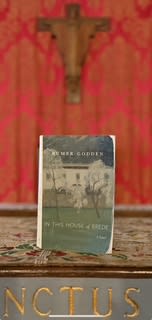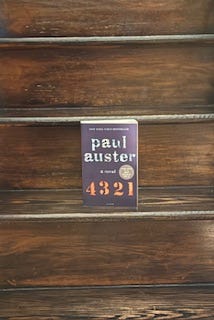Review of TWO "100" (see below) Books
I did not anticipate reading either. Thank God I did.
In 2007, I started a list books. After I finished a book, I put down the title, the author and a score. The score is theoretically between 0 and 100. In fact, any book lower than 80 does not get read so the rubber hits the road between 90 and 100. I realize this is a bit nebbish but lists and I go back to elementary school where I ranked and reranked all the teams and players in the different sports on the margin of my notebooks while sitting in class. There are very few novels that score 100. They compose the Desert Island A List (a future newsletter). I like to think that this is a tough club to get into so when I finished two novels within a couple days of each and they each scored a 100, either I had succumbed to the ubiquitous grade inflation of our time or something exceptional just happened. I like to think the latter is true. They are not new: 1969 and 2017. The writers are both dead and each book is, in my mind, their masterpiece. The books could not be more different in EVERY respect.
In This House of Brede by Rumer Godden was written 46 years ago and is a traditionally structured and written novel set in a Benedictine monastery. Its unforgettably and meticulously drawn characters revolve around a few dozen cloistered nuns. Godden treats the nuns and their vocation as seriously as the nuns treat theirs. I will never think of their commitment the same after reading this book. My wife was given it by a friend at a school reunion. It was such an unexpected choice, but it resonated because Rumer Godden’s novel, An Episode of Sparrows, was a lifeline during the pain of our oldest son’s diagnosis. Religion is rarely the subject of my readings and certainly a lengthy and involved story of cloistered nuns was not on any of my “lists”. It is so rejuvenating to be so wrong. Godden weaves the intense, difficult and communal life of rigorous faith with the internal worlds of women who are as human as they are religious. One role of a cloistered monastery is to concentrate the prayers and faith in a way that ordinary life cannot. People send their prayers to the nuns seeking the comfort derived from this concentrated and fully committed faith. This trust is so moving but made even more so by the very human vessels these prayers are handed to. This daily commitment is both complimented and challenged by many extraordinary but not melodramatic plot twists that reveal and instruct with the power of parable. In the end, this cloistered world becomes for the reader not only a study of faith but a window into the worlds outside the monastery’s grilled windows and locked doors. Philippa, the heroine in this ensemble piece, decamps from her high-powered job at 45 to join the monastery to seek meaning, solace and purpose. We the reader are asked to do the same as we take Godden’s hand and set aside our prejudices and stereotypes and allow her world to illuminate from within ours.
4321 by the recently deceased Paul Auster is long – 970 pages. Its length was the sole reason I avoided what many consider to be Auster’s masterpiece. The same readers likely share with me the opinion that Auster was THE great post-modern writer. His works have embedded within them the disarming feints and twists that are a deconstruction signature of postmodern literature; however, what separates Auster, in my mind, is his ability to traffic our human hearts. 4321 was read by Auster and I listened to 80% of it. It is one of the two great readings I have experienced - Auster’s baritone voice giving his beautiful prose a rhythmic wonder. I did not want this novel to end.
The structure is complex. It is the story of one boy growing up in the late Fifties and the Sixties. Born in Newark, the story divides at his birth into four separate narratives. Auster’s chapter markings (2.1 = first version of Archie, 2.2 = second version of Archie) help but a certain amount of confusion reigns. I suspected as time went on that that was one of the points of the novel. It is a massive multi-layered coming of age novel that captures boys and young men as well as anything I have read. It is a very Jewish, East Coast based narrative. That and the role of sex (all kinds) reminds me of Philip Roth, but Auster writes with a much more empathetic and lyric pen than the snarky Roth. The context of the turbulent mid-decades of the 20th century is the gilded frame within which his portrait shines. Especially for me, a WASP born in a then comparatively ethnic free California, this context simply shimmered.
Both books came out of left field. One I never dreamed of reading and the other just seemed to be a bridge too far. Both reasons may prevent anyone reading this letter from tackling either. I get it. They came to me from my wife’s high school reunion and from a near random click onto Auster’s audible. However, I think their “left field” origins are the undefinable reason why I discovered two “100s” at the same time. I may need to spend more time in “left field”.
NOTE: as some of you are aware, the Marrisa Roy for LA City Attorney fundraiser in Pasadena has been postponed to an early TBD November date. Marrisa is on a roll with many serious endorsements behind her so November should be just the right time to give her our support. Thank you …



